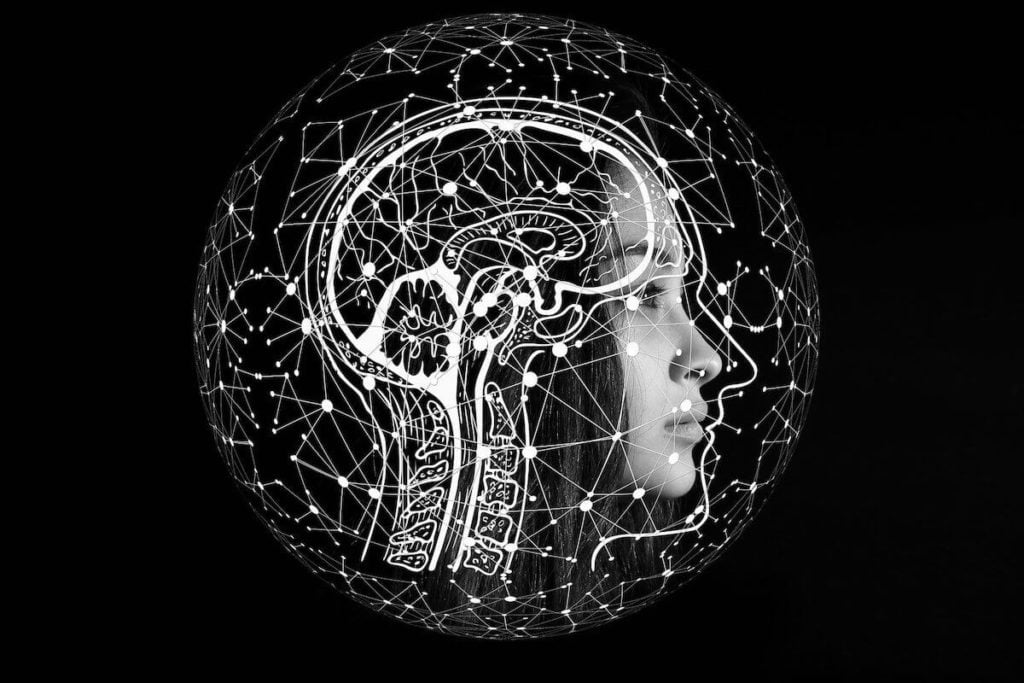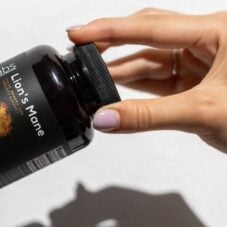Nootropics
What Are Nootropics and Cognitive Enhancing Supplements?
You’ve probably seen ads for smart drugs, cognitive enhancers, memory supplements, brain vitamins, and intelligence boosters. You may have even come across some ads for our Intelligent Labs Seneca Nootropic Complex! In this article, we’ll dive into the amazing world and benefits of natural nootropics!
Table of Contents
What are nootropics?
Nootropics can refer to natural food products like caffeine, panax ginseng, and ginkgo biloba. They can also refer to food supplements or medications that enhance cognitive ability.
Different nootropics affect your brain health in a variety of ways. Some products may help with memory and mental clarity. Others may give you an energy and productivity boost. Some may even offer mood enhancement and relaxation.
When did nootropics start?
Nootropics have been around for thousands of years. But the term was only officially coined in 1972 by Corneliu Giurgea, a Romanian psychologist. The term is a portmanteau from the Greek “noos” (meaning mind) and “tropein” (meaning to bend). Thus, it literally means “to bend the mind”. Giurgea also synthesized piracetam, the first-ever synthetic cognitive enhancer and smart drug.
According to Giurgea, these are the 5 characteristics of a nootropic (1):
- Enhances memory and learning
- Improves natural cognitive functions
- Safe, non-toxic, and possess very few side effects
- Protects the brain from various physical or chemical injuries
- Enhances the resistance of learned behaviors or memories to disruptive conditions
What are the different types of nootropics?
There are 2 types of nootropics – natural and synthetic.
Natural nootropics
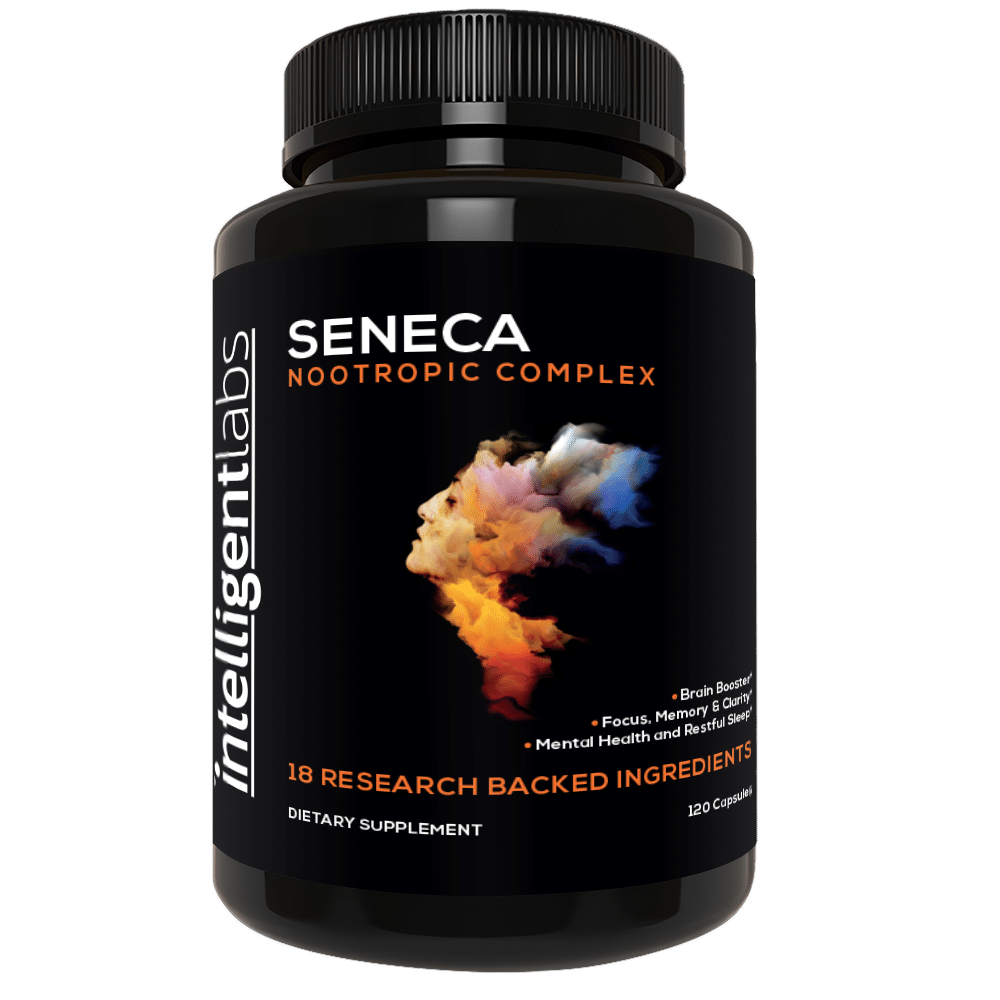
As the name suggests, these come from natural ingredients. They can be single-ingredient or multiple-ingredient (aka nootropic stack).
Here are a few examples:
- Ginkgo biloba – an old tree species native to China, dating from over 290 million years ago.
- L-theanine – an amino acid found in green tea.
- B-vitamins – found in whole foods like spinach, salmon, and delicious seafood like oysters.
- Omega-3 fatty acids – fatty acids with many health benefits, found abundantly in fish.
- Caffeine – found in that cuppa Joe you drink in the morning!
Synthetic nootropics
These are substances that aren’t found in nature and are made in a laboratory. Prescription meds like Adderall or Ritalin belong in this category.
How do nootropics work?
Nootropics work to improve cognitive function and unlock the brain’s true potential. You won’t gain superpowers overnight. But depending on what you take, you may experience a boost in various cognitive abilities. This includes making decisions, solving problems, creativity, focus, memory, and better recall.
Additionally, some products may help improve your mental drive and motivation. So if you find yourself lacking the mental strength to accomplish tasks, consider taking a nootropic.
With that said, nootropics are not created equally. Some may benefit only healthy individuals. Some compounds, like caffeine, only have a short-term effect. Others, like the herb Bacopa monnieri, will need to be taken daily for a few weeks to experience any effects.
What are nootropic stacks?
Nootropic stacks are a combination of nootropics. You have the flexibility to mix and match various ingredients to achieve their desired effect. But it’s best to leave stacking to experts. Many come in pre-made stacks, like our Seneca Nootropic Complex.
What nootropics aren’t…
Don’t mistake nootropics for psychedelics and hallucinogens. True nootropics will give you a mental boost. But they’re not going to give you hallucinations. And you’re definitely not going to be trippin’! You won’t be able to feel colors or taste sounds. You also won’t see stationary objects around you come to life. So, don’t expect to get a ‘high’ by taking them.
Who should take nootropics?
There’s a wide range of people who take nootropics for a variety of reasons. Anyone who can use more brainpower to reach their goals can benefit from taking them. This includes:
- Students preparing for an exam.
- People in competitive jobs who need to focus on their workflow.
- Athletes who need to boost mental energy and physical performance. If you’re wondering, most natural nootropics aren’t on the banned list in sports organizations.
- Tradespeople who are seeing a decrease in productivity and are keen to get back on track.
In short, nootropics may benefit those wanting to improve their brain health and mental performance.
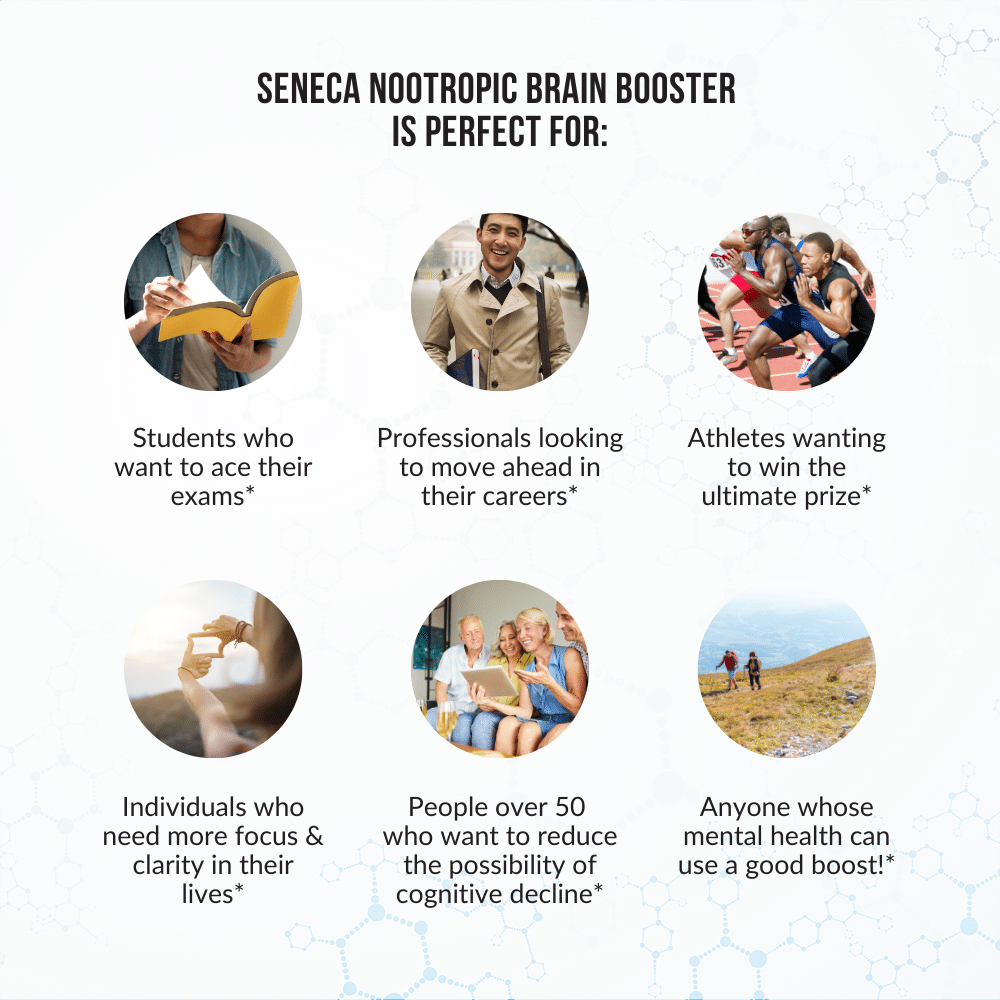
When did nootropics become popular?
Even if the word ‘nootropics’ was only coined a few decades ago, they have been in use for thousands of years. Psychoactive substances, or those that affect the mind, have been in use for millennia for religious, medicinal, and recreational reasons (2).
In ancient Ayurveda, there are medicinal herbs called Medhya Rasayanas. These herbs are used to improve memory, intellect, immunity, nutrition, and overall health (3). One of these herbs is Bacopa monnieri, a nootropic whose popularity has continued until the present day.
What are the best natural nootropics out there?
In no particular order, these are some of the best natural nootropics you can take:
1) Lion’s mane mushroom
Lion’s mane mushrooms (Hericium erinaceus) look like their namesake – the mane of a lion! This culinary-medicinal ‘shroom is not only delicious (they say it tastes like crab or lobster).
Lion’s mane is said to help improve concentration and reduce anxiety and depression. This is according to a 4-week study on female subjects (4).
Another study reported that the mushroom helped improve mild cognitive impairment in older Japanese adults. The elderly subjects took lion’s mane for 16 weeks. During this period, their cognitive scores increased significantly. However, a month after they stopped taking the mushroom, the scores went down as well. This suggests that lion’s mane does have cognitive effects but will need to be taken consistently. Fortunately, the study showed no adverse effects throughout the study duration (5).
Related article: The Ultimate Guide To Lion’s Mane Mushrooms
2) Caffeine
Who doesn’t love their cuppa Joe first thing in the morning? Drinking coffee helps shake the mental cobwebs off to prepare you for the day ahead. Not surprisingly, coffee is one of the most widely consumed beverages in the world. In fact, over 2 billion cups are consumed every day (6)!
When taken in low to moderate doses (40mg to 300mg), caffeine can help improve alertness, attention, and reaction time. People who work in jobs that require optimal physical and cognitive function can benefit from caffeine (7).
3) Bacopa monnieri
Bacopa monnieri, a non-aromatic herb, contains active compounds called bacosides. They act as antioxidants and protect the brain from free radical damage (8).
This non-aromatic herb has been used since ancient times to enhance brain function (3). In one study, this herb helped improve cognition and reduced reaction time in over 400 subjects. They took it daily for at least 12 weeks (9).
4) Ginkgo biloba
Ginkgo biloba leaf extracts reveal that it contains powerful antioxidants. Some studies show promising results in terms of improving cognitive function in healthy older adults.
One such study followed male subjects for 8 months. They took ginkgo biloba daily and came back with interesting findings. Apparently, ginkgo helped reduce blood viscosity and improved blood flow to the brain. This resulted in a boost in global cognitive function (10).
Another study followed healthy, older subjects for 6 weeks. They self-reported enhanced speed in their processing and recall abilities (11).
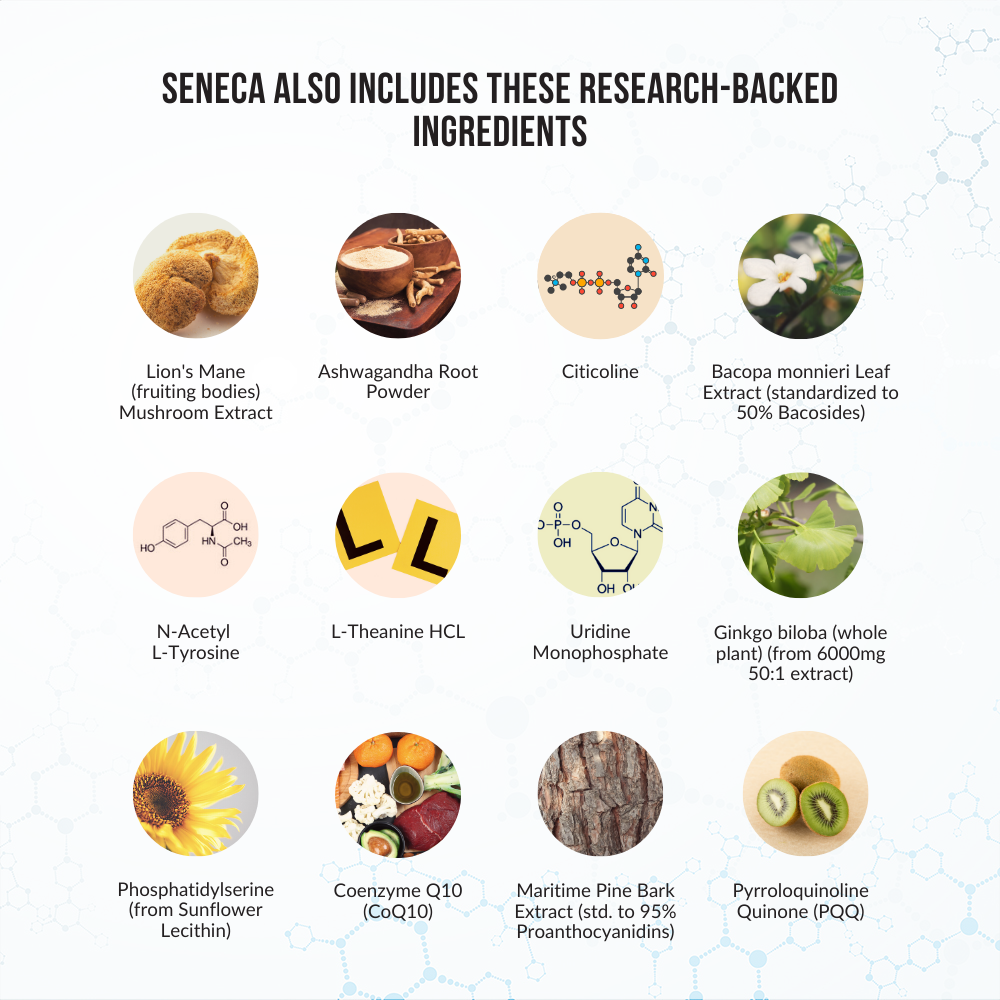
5) Ashwagandha
Ashwagandha (Withania somnifera) is another herb used in ancient Ayurvedic medicine (3).
This herb may help reduce anxiety. It may also improve mental health in individuals with moderate to severe anxiety. The longer the intake, the more significant the reduction in anxiety (12).
As for safety and efficacy, it seems to be pretty safe. In one study, subjects who took this herb twice a day for 8 weeks reported no adverse effects (13).
6) L-Theanine
Do you find yourself feeling calm and relaxed after a cup of tea? Well, that’s because of L-Theanine, a calming amino acid found naturally in tea.
One study found that people who took 200mg of L-theanine felt more relaxed, but not drowsy or sleepy (14). Another study supported this outcome by showing that L-theanine increased alpha brainwave activity. This indicates that the mind is in a relaxed but non-drowsy state (15).
Also, L-theanine can pass through the blood-brain barrier and has neuroprotective effects. A 47.5mg daily dose was enough to slow down cognitive decline in elderly subjects (16).
7) Phosphatidylserine
Phosphatidylserine (PS) is found in every single cell in the human body, with the highest concentrations found in brain cell walls (17).
There are a number of studies that support the nootropic effects of PS. For instance, elderly people with mild cognitive impairment experienced better memory recall after taking soy lecithin PS for six months (18).
PS also helps lower cortisol levels in healthy individuals (cortisol is a major stress hormone). A 100mg dose taken 3 times daily is enough to lower stress and anxiety. This dose is also sufficient for better mood and sleep (19).
8) Uridine monophosphate
Uridine monophosphate (UMP) is the bioavailable form of uridine, a nucleoside found in RNA (ribonucleic acid). There are limited human studies, but the initial results are promising.
Animal studies support its antidepressant effect, as well as its role in cognitive development. Additionally, it may also help stimulate GABA and dopamine production, which may improve focus and relaxation (20).
9) B-complex vitamins
All vitamins are important when it comes to optimal health and well-being. But B-complex vitamins, especially B6, B9, and B12 are considered major players when it comes to brain health. This is because these 3 B vitamins contribute to normal homocysteine metabolism (21).
High homocysteine levels are linked to depression, cerebral vascular disease, and neurotransmitter deficiency (22). Moreover, it is also an early marker for cognitive impairment in the elderly (23).
However, it’s still important to get the full range of B-complex vitamins. A deficiency in one or more B vitamins may lead to health issues. This includes less-than-optimal brain function and a possible decline in cognitive function.
One study even suggests that taking the full range of B vitamins at doses that exceed current recommendations may help preserve brain health (24).
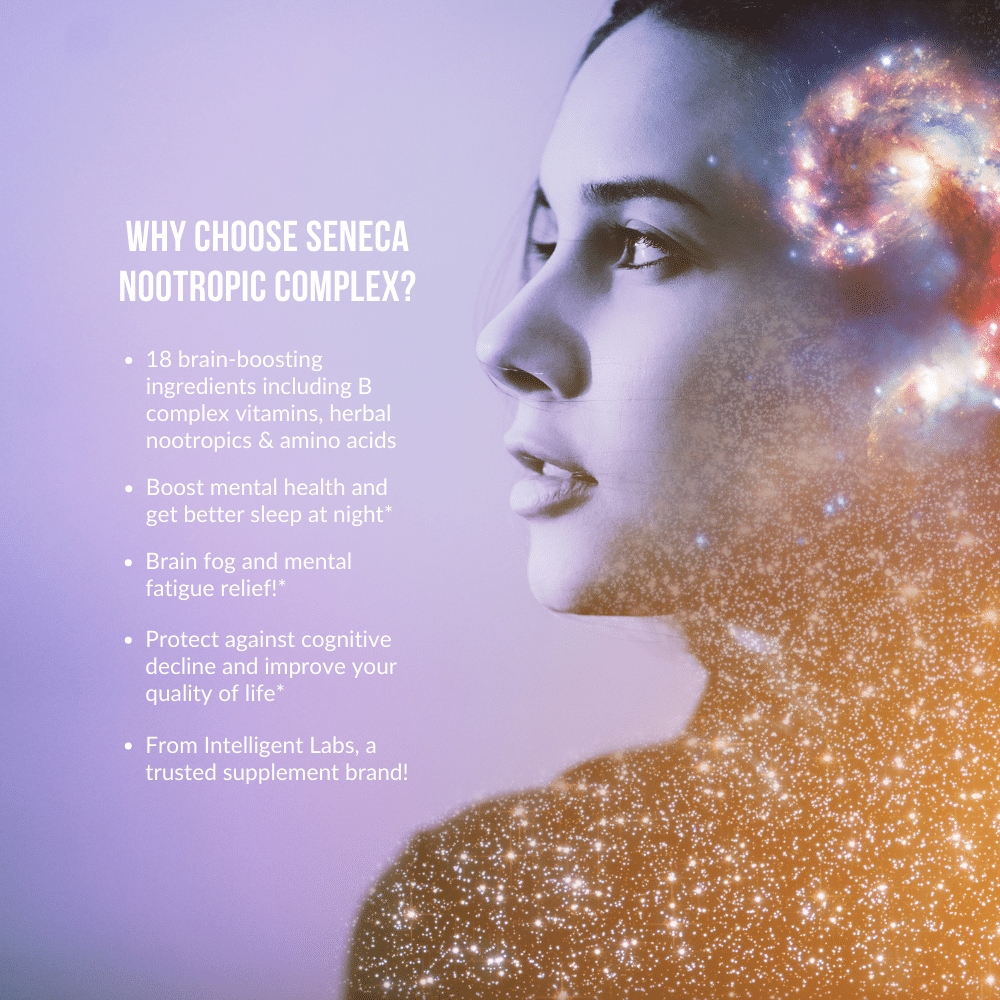
What’s the best nootropic stack for overall cognitive support?
The best nootropic supplement is a mix of brain vitamins. Ideally, a combination of B-complex vitamins and proven herbs. While there are a number of brands out there, we firmly believe that our Intelligent Labs Seneca Nootropic Complex is the best one in the market!
Seneca combines 18 research-backed ingredients in one capsule. This includes 6 B vitamins in their body-ready forms. The other 12 ingredients in our Seneca stack are botanical extracts, amino acids, and antioxidants.
Here’s a summary of all the Seneca ingredients:
Part 1: B-Complex Vitamins
| PART 1: B-COMPLEX VITAMINS IN SENECA | PROVEN HEALTH BENEFITS |
| Thiamine (B1) | Contributes to normal psychological function. It also boosts attention, energy, and motivation (21) |
| Riboflavin (B2) | Helps reduce tiredness and fatigue, also used to treat migraines (21) |
| Niacin (B3) | Helps with important psychological functions, reduces tiredness and fatigue. Also stimulates dopamine and serotonin (21) |
| Pyridoxine (B6) | Regulates hormonal activity, such as dopamine, epinephrine, GABA, and more (21) |
| Folate (B9) | Helps with amino acid and DNA synthesis, gene expression, immune function, and various brain functions (21) |
| Cobalamin (B12) | Contributes to neurological and psychological functions. Also helps supports better cognition, memory and mood (21) |
Part 2: Botanical Extracts, Amino Acids, Antioxidants
| PART 2: OTHER SENECA INGREDIENTS | RESEARCH HAS SUGGESTED THE FOLLOWING POTENTIAL HEALTH BENEFITS |
| Lion’s mane mushroom | May help with concentration, anxiety and depression (10). May also help improve mild cognitive impairment (11) |
| Ashwagandha | May help reduce anxiety and improve mental health (12) |
| Bacopa monnieri | May protect the brain from oxidative stress (7). May possibly help improve cognition and reduce reaction time (6) |
| Citicoline | May help improve memory performance (24) and enhance cognitive ability (25) |
| N-acetyl L-Tyrosine | May help maintain alertness and cognitive performance during sustained work periods and sleep loss (26, 27) |
| L-Theanine HCL | May possess neuroprotective effects and slow down cognitive decline (16). Puts brain in a relaxed but non-drowsy state (15) |
| Uridine monophosphate | May have calming effects and help manage symptoms of bipolar disorder (20) |
| Ginkgo biloba | May help boost global cognitive function by improving blood flow to brain (8). May also help with information processing and memory recall (9) |
| Phosphatidylserine | May help with memory recall (18), improve mood and lower anxiety levels (19) |
| Coenzyme Q10 (CoQ10) | May help fuel brain cells and protect them against oxidative stress (28, 29) |
| Maritime pine bark | May offer neuroprotection and may help improve synaptic plasticity in the brain (30, 31) |
| PQQ | May help improve mood and sleep quality, and reduce stress levels (32) |
Final thoughts
Seneca is a synergistic formula made of 100% natural ingredients. It’s designed to help your brain fire on all cylinders. It’s also free from caffeine and other stimulants to avoid ‘artificial’ highs. To make the most of your nootropic intake, don’t forget to supplement it with a healthy lifestyle!
References
(1) The nootropic concept and its prospective implications, Prof. Corneliu E. Giurgea, Drug Development ResearchVolume 2, Issue 5 p. 441-446
(2) Historical and cultural aspects of man’s relationship with addictive drugs, Marc-Antoine Crocq, Dialogues Clin Neurosci . 2007;9(4):355-61.
(3) Nootropic herbs (Medhya Rasayana) in Ayurveda: An update, Reena Kulkarni 1, K J Girish, Abhimanyu Kumar, Pharmacogn Rev . 2012 Jul;6(12):147-53.
(4) Reduction of depression and anxiety by 4 weeks Hericium erinaceus intake, Mayumi Nagano, Kuniyoshi Shimizu, Ryuichiro Kondo, Chickako Hayashi, Daigo Sato, Katsuyuki Kitagawa, Koichiro Ohnuki, Biomed Res . 2010 Aug;31(4):231-7.
(5) Improving effects of the mushroom Yamabushitake (Hericium erinaceus) on mild cognitive impairment: a double-blind placebo-controlled clinical trial, Koichiro Mori, Satoshi Inatomi, Kenzi Ouchi, Yoshihito Azumi, Takashi Tuchida, Phytotherapy ResearchVolume 23, Issue 3 p. 367-372
(6) Economics of coffee, https://en.wikipedia.org/wiki/Economics_of_coffee
(7) A review of caffeine’s effects on cognitive, physical and occupational performance, Tom M McLellan, John A Caldwell, Harris R Lieberman, Neurosci Biobehav Rev . 2016 Dec;71:294-312.
(8) Bacopa monniera, a reputed nootropic plant: an overview, A Russo, F Borrelli, Phytomedicine . 2005 Apr;12(4):305-17.
(9) Meta-analysis of randomized controlled trials on cognitive effects of Bacopa monnieri extract, Chuenjid Kongkeaw, Piyameth Dilokthornsakul, Phurit Thanarangsarit, Nanteetip Limpeanchob, C Norman Scholfield, J Ethnopharmacol . 2014;151(1):528-35.
(10) Cognitive performance, SPECT, and blood viscosity in elderly non-demented people using Ginkgo biloba, R F Santos, J C Galduróz, A Barbieri, M L Castiglioni, L Y Ytaya, O F Bueno, Pharmacopsychiatry . 2003 Jul;36(4):127-33.
(11) An examination of the efficacy of Ginkgo biloba extract EGb761 on the neuropsychologic functioning of cognitively intact older adults, J A Mix, W D Crews Jr, J Altern Complement Med . 2000 Jun;6(3):219-29.
(12) A double-blind, placebo-controlled evaluation of the anxiolytic efficacy ff an ethanolic extract of withania somnifera, C Andrade, A Aswath, S K Chaturvedi, M Srinivasa, R Raguram, Indian J Psychiatry . 2000 Jul;42(3):295-301.
(13) Safety of Ashwagandha Root Extract: A Randomized, Placebo-Controlled, study in Healthy Volunteers, Narsing Verma, Sandeep Kumar Gupta, Shashank Tiwari, Ashok Kumar Mishra, Complement Ther Med . 2021 Mar;57:102642.
(14) Effect of Green Tea Phytochemicals on Mood and Cognition, Christina Dietz, Matthijs Dekker, Curr Pharm Des . 2017;23(19):2876-2905.
(15) L-theanine, a natural constituent in tea, and its effect on mental state, Anna C Nobre, Anling Rao, Gail N Owen, Asia Pac J Clin Nutr . 2008;17 Suppl 1:167-8.
(16) Neuroprotective effects of theanine and its preventive effects on cognitive dysfunction, Takami Kakuda, Pharmacol Res . 2011 Aug;64(2):162-8.
(17) Phospholipid—the dynamic structure between living and non-living world; a much obligatory supramolecule for present and future, Manikandan Alagumuthu, Divakar Dahiya, Poonam Singh Nigam, AIMS Molecular Science 2019, Volume 6, Issue 1: 1-19.
(18) Soybean-derived phosphatidylserine improves memory function of the elderly Japanese subjects with memory complaints, Akito Kato-Kataoka, Masashi Sakai, Rika Ebina, Chiaki Nonaka, Tsuguyoshi Asano, Takashi Miyamori, J Clin Biochem Nutr . 2010 Nov;47(3):246-55.
(19) Effects of soy lecithin phosphatidic acid and phosphatidylserine complex (PAS) on the endocrine and psychological responses to mental stress, J Hellhammer, E Fries, C Buss, V Engert, A Tuch, D Rutenberg, D Hellhammer, Stress . 2004 Jun;7(2):119-26.
(20) Uridine attenuates morphine-induced conditioned place preference and regulates glutamate/GABA levels in mPFC of mice, Ping Liu, Xiaohang Che, Lisha Yu, Xiaofeng Yang, Nina An, Wu Song, Chunfu Wu, Jingyu Yang, Pharmacol Biochem Behav . 2017 Dec;163:74-82.
(21) Food and Feed Information Portal Database, https://ec.europa.eu/food/food-feed-portal/screen/home?event=search
(22) The homocysteine hypothesis of depression, Marshal Folstein, Timothy Liu, Inga Peter, Jennifer Buell, Lisa Arsenault, Tammy Scott, Wendy W Qiu, Am J Psychiatry . 2007 Jun;164(6):861-7.
(23) Identification of cognitive impairment in the elderly: homocysteine is an early marker, M Lehmann, C G Gottfries, B Regland, Dement Geriatr Cogn Disord . 1999 Jan-Feb;10(1):12-20.
(24) Citicoline improves memory performance in elderly subjects, X A Alvarez, M Laredo, D Corzo, L Fernández-Novoa, R Mouzo, J E Perea, D Daniele, R Cacabelos, Methods Find Exp Clin Pharmacol . 1997 Apr;19(3):201-10.
(25) Improved Attentional Performance Following Citicoline Administration in Healthy Adult Women, Erin McGlade, Allison Locatelli… Food and Nutrition Sciences Vol.3 No.6, June 2012
(26) The effects of tyrosine on cognitive performance during extended wakefulness, D F Neri, D Wiegmann, R R Stanny, S A Shappell, A McCardie, D L McKay, Aviat Space Environ Med . 1995 Apr;66(4):313-9.
(27) Tyrosine improves cognitive performance and reduces blood pressure in cadets after one week of a combat training course, J B Deijen, C J Wientjes, H F Vullinghs, P A Cloin, J J Langefeld, Brain Res Bull . 1999 Jan 15;48(2):203-9.
(28) Coenzyme Q10 effects in neurodegenerative disease, Meredith Spindler, M Flint Beal, Claire Henchcliffe, Neuropsychiatr Dis Treat . 2009;5:597-610.
(29) Evaluation of coenzyme Q as an antioxidant strategy for Alzheimer’s disease, Teri L Wadsworth, James A Bishop, Anuradha S Pappu, Randall L Woltjer, Joseph F Quinn, J Alzheimers Dis . 2008 Jun;14(2):225-34.
(30) Pharmaceutical and nutraceutical effects of Pinus pinaster bark extract S. Iravani and B. Zolfaghari, Res Pharm Sci. 2011 Jan-Jun; 6(1): 1–11.
(31) Brain-Targeted Proanthocyanidin Metabolites for Alzheimer’s Disease Treatment, Jun Wang, Mario G. Ferruzzi, Lap Ho, Jack Blount, Elsa M. Janle, Bing Gong, Yong Pan… Journal of Neuroscience 11 April 2012, 32 (15) 5144-5150
(32) Effects of Oral Supplementation with Pyrroloquinoline Quinone on Stress, Fatigue, and Sleep, Masahiko Nakano, Tetsuro Yamamoto, Hisayoshi Okamura, Akira Tsuda, Yasuyuki Kowatari, Vol 2, No 8 (2012)

